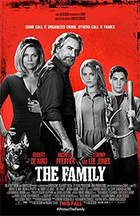The Family
|  It’s really anyone’s guess what Luc Besson is trying to do in The Family, a surprisingly flat satire that finds a mob family in the witness protection program relocating to a small village in Normandy, France. The casting is nothing less than sublime: Robert De Niro brings with him the accumulated decades of embodying mobsters in Coppola’s The Godfather Part II (1974) and Scorsese’s GoodFellas (1990), and Casino (1995), while Michelle Pfeiffer returns to the brittle, harried sense of mob-wife frustration she mined so beautifully in Jonathan Demme’s Married to the Mob (1988). Unfortunately, their presence tends to draw our attention back to those earlier, and much better, films (especially Demme’s, which delicately balances comedy, sympathy, and violence in ways that Besson seems completely unaware of), which leave The Family looking all the more anemic. It’s really anyone’s guess what Luc Besson is trying to do in The Family, a surprisingly flat satire that finds a mob family in the witness protection program relocating to a small village in Normandy, France. The casting is nothing less than sublime: Robert De Niro brings with him the accumulated decades of embodying mobsters in Coppola’s The Godfather Part II (1974) and Scorsese’s GoodFellas (1990), and Casino (1995), while Michelle Pfeiffer returns to the brittle, harried sense of mob-wife frustration she mined so beautifully in Jonathan Demme’s Married to the Mob (1988). Unfortunately, their presence tends to draw our attention back to those earlier, and much better, films (especially Demme’s, which delicately balances comedy, sympathy, and violence in ways that Besson seems completely unaware of), which leave The Family looking all the more anemic.De Niro plays Giovanni Manzoni, a former Brooklyn Mafioso who ratted out his mob family and is now hiding under the generic WASP-ish name Fred Blake, and Pfeiffer plays his long-suffering wife Maggie. They have two kids, 17-year-old daughter Belle (Dianne Agron) and 14-year-old son Warren (John D’Leo), both of whom are already precocious imitators of their father’s dark side, albeit in drastically different ways. While Belle puts on airs of golden virginal purity, she has a violent streak that is positively disturbing; the manner in which she goes about beating a trio of horny French teens with a broken tennis racquet quickly goes from amusing got-what-they-deserved satisfaction to squirm-in-your-chair discomfort as her violence rises to the level of the orgasmic, which makes is all the more discomfiting when she sets her underage eyes on a university student working as a temporary teacher at her school. Warren, on the other hand, is an expert thief, manipulator, and con artist, and the movie’s best sequence stitches together the lithe manner in which he sizes up all the kids in his new school and figures out how to work them against each other to his own advantage (it’s the one time the movie feels really alive, and it made me wish that the whole film had been about this one subplot). The family’s protection is overseen by a government functionary named Robert Stansfield, who is played with all the craggy, world-weary exhaustion that Tommy Lee Jones can muster for another paycheck. Meanwhile, the Manzonis are being hunted by their scorned former associates, who are played by a rogue’s gallery of familiar-looking Italian heavies, including Jimmy Palumbo, Domenick Lombardozzi, Stan Carp, Vincent Pastore, Jon Freda, Michael J. Panichelli Jr., and Paul Borghese. As scripted by Besson and Michael Caleo, who worked for several years as a story editor on The Sopranos, The Family is clearly meant to derive its ostensible humor from the cultural conflict that would naturally ensue from such a family—perhaps the ultimate “ugly Americans”—trying to fit into provincial French culture. Unfortunately, Besson doesn’t do much with it that wouldn’t have roughly the same effect had it been set in small-town suburbia (or suburban New Jersey, for that matter), which means that the Manzonis’ unleashing their pent-up violence on the snobbish, condescending Gauls is largely void of any meaning outside its own sense of tacky exuberance. The film generates some laughs from the awkward manner in which De Niro attempts to assimilate and blend in, particularly when he claims to his new neighbor that he’s a historian writing a book on the invasion of Normandy, a topic of which he is completely ignorant and that everyone in the village knows a great deal about. He is also intent on writing his memoirs, which provides a convenient excuse for voice-over narration to play in counterpoint to what’s happening on-screen. Besson’s best films, including Le grand bleu (1988), La Femme Nikita (1991), and Léon: The Professional (1994), have successfully mixed melodrama and action in earnest, and he tends to be at his worst when he’s trying to be overtly funny (to wit, the disaster that is 1997’s The Fifth Element). In recent years he has focused primarily on writing and producing various B-movie action franchises such as the Transporter films, and the time off from behind the camera has not worked well for him. The incongruous manner in which he tries to mix sitcom-cute scenarios with hard-hitting violence is less shocking than it is simply confusing and off-putting, and he never manages to get the Manzoni family to become anything other than caricatures—and generally unlikeable ones, at that. By the time the story has drawn to its by-the-numbers climax involving Fred’s former associates descending on the French village and turning it into a gangland war zone, there isn’t much worth caring about and nothing left to laugh about. Copyright ©2013 James Kendrick Thoughts? E-mail James Kendrick All images copyright © Relativity Media |
Overall Rating: 
 (2)
(2)


